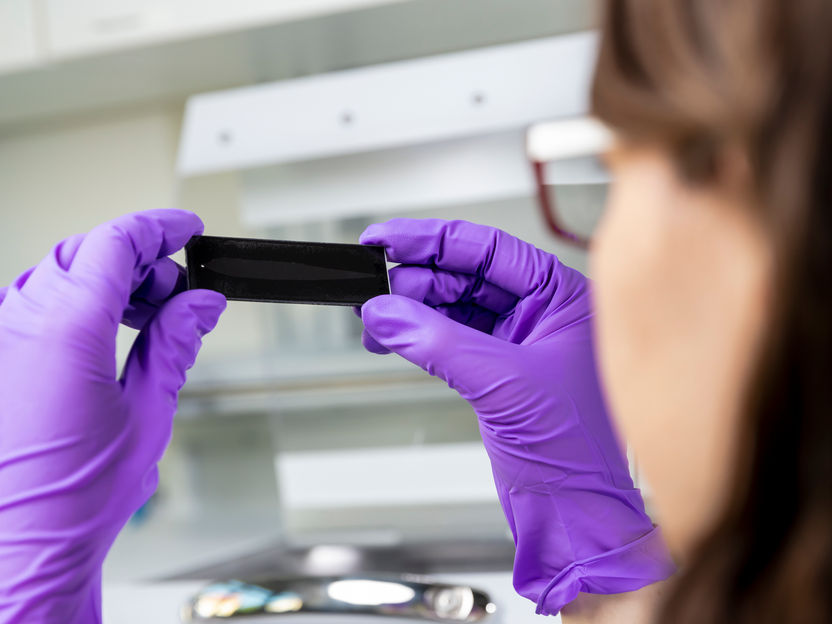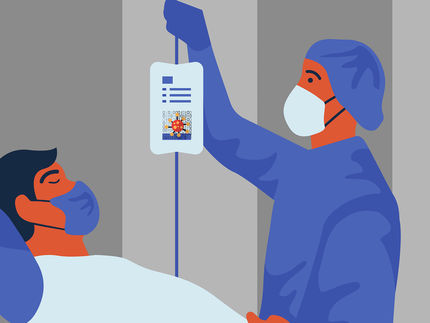Versatile and reliable SARS-CoV-2 antibody assay
Automated microarray rapid test for detecting SARS-CoV-2 antibodies
Advertisement
During the continued progression of the Corona pandemic, rapid, inexpensive, and reliable tests will become increasingly important to determine whether people have the associated antibodies – either through infection or vaccination. Researchers at the Technical University of Munich (TUM) have now developed such a rapid antibody test. It provides the result in only eight minutes; the aim is to further reduce the process time to four minutes.

Lead author Julia Klüpfel with a measuring chip at the laboratory of TranslaTUM.
Sebastian Kissel / TUM
There are currently more than 20 different test procedures available for determining whether a person has antibodies against the new Corona virus. The waiting times for the results range between ten minutes and two and a half hours.
Matrix effects reduce the sensitivity of many of the methods. The more sensitive assays require numerous steps, making them expensive. In addition, most tests can identify only a single kind of antibody, forcing a choice between testing either for immunity through vaccination or through survived infection.
An interdisciplinary research team at the Technical University of Munich, led by the Chair of Analytical Chemistry and Water Chemistry, has now developed a low-cost automated rapid test that is highly sensitive and highly specific in detecting the three most important antibodies. The project, called CoVRapid, was funded by the Bavarian Research Foundation (BFS).
Modification of a proven process
The measurement is carried out on a foil-based sensor chip using the MCR microarray analysis platform of the Munich-based supplier GWK Präzisionstechnik GmbH. The device displays its measurement results within a few minutes after injecting a blood sample.
Today, the procedure still takes eight minutes, but building on current research, the waiting time will soon be reduced to just four minutes. IgG antibodies against a protein fragment of the SARS-CoV-2 receptor binding domain (RBD), the spike protein (S1 fragment) and the nucleocapsid protein (N) are simultaneously analyzed.
Deployable against new mutants
New mutant proteins can be very easily integrated into the chip. For this project, the research team is collaborating with the Planegg-based company ISAR Bioscience, which produces the respective viral proteins biotechnologically and modifies them for analytical use. The process used to fix the proteins onto the sensor chip has been tried and tested for many years.
"We have already developed reliable rapid tests for antibiotics in milk and for Legionella using this technology platform," says adjunct teaching professor Dr. Michael Seidel, head of the Bioanalytics and Microanalytical Systems group at TUM's Department of Analytical Chemistry and Water Chemistry. "The system has already proven itself in practical use. Our ‘CoVRapid’ rapid test may thus be deployed in clinics, medical offices and research laboratories in the very near future."
The new test will answer questions about corona immunity
However, the new rapid test can do even more: the microarray technology, which allows to accommodate up to 100 measurement points on a single chip, is so sensitive that it can even determine the concentration of antibodies in a sample.
"The present research begs questions like: How well do vaccinations work? How long does immunity last? When will vaccinations need to be readministered? With its high sensitivity, our CoVRapid will help us find the answers to these questions," says lead author Julia Klüpfel.
In the long term, the team is also planning on including other pathogens in the panel so the assay can be used, for example, to evaluate the effectiveness of an influenza vaccination.
Original publication
Klüpfel, J.; Koros, R.; Dehne, K.; Ungerer, M.; Würstle, S.; Mautner, J.; Feuerherd, M.; Protzer, U.; Hayden, O.; Elsner, M.; Seidel, M.; "Automated, flow-based chemiluminescence microarray immunoassay for the rapid multiplex detection of IgG antibodies to SARS-CoV-2 in human serum and plasma (CoVRapid CL-MIA)"; Analytical and Bioanalytical Chemistry; 13.05.2021

























































